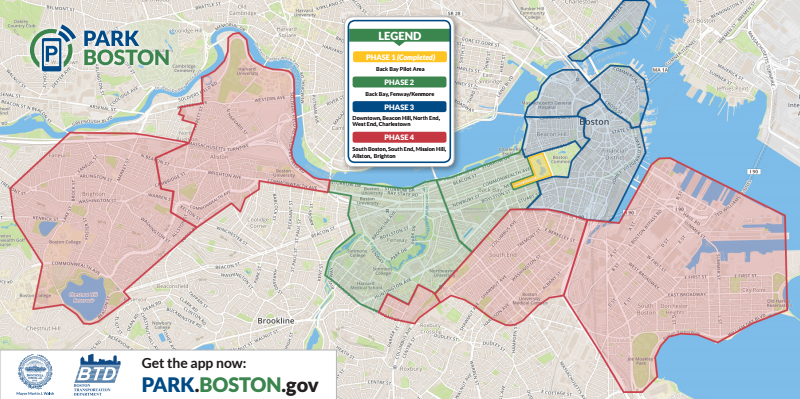
Back in January Mayor Marty Walsh announced in his first State of the City address that the city would be partnering with ParkBoston to allow residents to pay for parking meters using just a mobile device in specified communities. After nine weeks of piloting, the mayor has deemed the tandem successful and is expanding it citywide.
According to the City of Boston, teaming up with ParkBoston resulted in 15,000 app downloads (on both iOS and Android devices) which facilitated more than 12,000 parking transactions. Perhaps most impressive about these statistics is the fact ParkBoston was only available in the Back Bay during the pilot.
“Last week I said we cannot delay making innovative improvements to our transportation system,” said Mayor Walsh in a statement. “Thousands of Bostonians have already embraced this new and convenient technology, and expanding this service throughout the city will make the experience of paying for parking easier for each and every user.”

By the end of summer 2015, all municipal metered spaces, more than 8,000, will accommodate remote payments via the app but this implementation will be done in three phases:
- Remaining spaces in Back Bay and the Fenway/Kenmore area
- Downtown, Beacon Hill, the West End, North End, and Charlestown
- South Boston, the South End, Mission Hill, Allston, and Brighton.
These “smart meters” will not only allow for remote payment, but will also track data for City Hall to better understand parking problems across the city in general as well as on the street level. For added convenience, too, the app also alerts users for when their meter starts to run low.
“It made sense to grow to contiguous areas, by first expanding from the pilot location in the Back Bay and then to towards Fenway as that area begins to come alive for baseball season,” said Tracey Ganiantsos, a Boston Transportation Department spokesperson. “This phased approach will also allow BTD to make sure the system is working properly and officer communication is functioning as it should.”
Prospective parkers will be able to discern when their neighborhood will offer ParkBoston as an option by the emergence of logo decals on meters and erected street signage.
The partnership extension represents a significant time and resource contribution to the city in terms of traffic and parking, which often go hand-in-hand at the expense of drivers.
Most recently, the City of Boston partnered with Waze, a real-time traffic aggregation app, to provide Greater Boston users a perpetually updated picture of how well, or not, the city’s vehicular flow is progressing.
Also in January, Boston extended its pilot program with TicketZen from three months to a year to better serve those who are slapped with a parking ticket. The app provides a platform for users to pay their fines simply and efficiently.
In South Boston, the city reconfigured its street layout to turn two-way streets into one-way only. Though this wasn’t a particularly tech savvy move, it was undertaken as a result of traffic issues stemming from mountainous winter snowbanks. Mother Nature’s wrath both bottlenecked traffic and in some cases completely eliminated street parking as a consequence.
That initiative, which was supposed to come to an end in April, has been extended into June and the possibility of it being made permanent is not out of the question.
“The community has really embraced ParkBoston, and we are excited to be bringing this type of innovation to more people so quickly,” added Gina Fiandaca, Commissioner of the Boston Transportation Department. “This is one of the first steps we are taking in overhauling the parking experience in Boston.”

